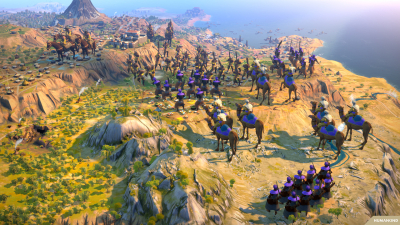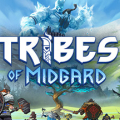HUMANKIND™ review
HUMANKIND™
HUMANKIND™ is a unique historical strategy game that redefines the entire genre, and it has captivated the hearts of millions of fans globally since its release on 17 August 2021. Developed by AMPLITUDE Studios and published by SEGA, the engrossing game gives you the freedom to rewrite the entire narrative of humankind. It is a strategic game born out of the civilization genre that generously provides players with the liberty of creating their histories by combining unique cultures.
HUMANKIND™ sports a sophisticated blend of real-time and turn-based strategy, merging the best features of several genres into this stunning piece of gaming perfection. It presents a social layer for its users where they can discover, explore, gain fame, and interact, all of which are cleverly integrated directly into the game. Exploring the landscapes, building cities, directing scientific research, leading an army; every decision you make reflects on your journey to becoming the dominant civilization on the planet.
THE GAMEPLAY OF HUMANKIND™
At the core of its gameplay, HUMANKIND™ centers around choices and combinations that bring strategic depth to the table, not seen in many other civilization-style games. As a player, you start from the dawn of human history and usher in your civilization to the modern era.
The game introduces the novel concept of Culture Stacking. Instead of sticking to a single civilization throughout the game, players can combine different cultures across eras, borrowing traits and techniques from each and creating a civilization that is a fusion of many. This feature allows players to adapt and react to emergent gameplay, adding a sense of depth and replayability to the game.
The game further offers a wide variety of terrain features and natural wonders. The space you inhabit impacts your civilization's development significantly and demands strategic thinking for efficient city planning and expansion. The capabilities of your in-game city aren't just determined by the infrastructure you build within it, but often, it's the geographical confinements that decide its prosperity. From floodable plains to storm-prone coasts, the choices are immense, providing a real-life city-building experience.
Combat adds another layer of strategic thinking. You're forced to interact with the environment, planning ahead and plotting a course of action. Instead of focusing solely on brute force, players often need to consider the lay of the land, the composition of an army, and their overall strategy.
Also noteworthy is the Fame system, a victory mechanic that functions like a scoreboard. Fame accrues over time depending on the players' actions and achievements and determines player rankings, enabling competitive gameplay.
However, despite all the strategic brilliance and depth, HUMANKIND™ does face some challenges. The pacing can be inconsistent, with the late game tending to drag and becoming a tad monotonous after hours of exciting gameplay. Also, the diplomacy system can be a bit unpredictable and frustrating at times due to the erratic behavior of NPCs. These issues impact player experience and can dull the otherwise exciting gameplay.
Overall, the unique gameplay, the forever-changing conditions, and the endless choices that one must make along the timeline make HUMANKIND™ a game that continues to enthrall its audience. It’s a canvas of history waiting to be painted with your brush strokes. With its ever-evolving facets and continuous developments, HUMANKIND™ stands to grow more captivating as users traverse through its dynamic landscapes.
Weaknesses of the HUMANKIND™
Despite its immersive gameplay and groundbreaking concepts, there are a few shortcomings that the HUMANKIND™ suffers from, which are worth considering.
Firstly, there are frequent complaints of crashing and glitch issues from players. Such crashes are troublesome and may result in loss of progress, thereby dampening the gaming experience.
The AI diplomacy is a facet of the game that has received criticism. Despite the game's massive trade and diplomatic systems, non-playable characters (NPCs) often exhibit erratic behavior, affecting important diplomacy stages and thereby impeding a seamless player experience.
Further, the late gaming stage can feel somewhat tedious and repetitive. The game can lose its tempo, making the civilization process feel prolonged. This dampens the excitement level of victory and could make the game feel psychologically exhausting for some users.
The tutorial is also commonly reported as confusing and not particularly helpful for new players. With the game’s complexity, a more effective tutorial is essential for retaining new players who may feel overwhelmed by in-game mechanics and concepts.
Users Impressions of HUMANKIND™
Despite noted weaknesses, HUMANKIND™ has roused positive reactions from players worldwide. Many laud the game for its dynamic simulation of history, citing that it offers an unprecedented level of freedom to recreate the world in one's image.
Players love the strategic depth and the plethora of choices available. They appreciate the fact that it is player-driven and allows for customization of one's civilization, offering a level of control rarely seen in similar games.
The innovation in the gamification of culture and real-world events is another standout feature for the user base. Nevertheless, while most users are exhilarated by the compelling uniqueness of the game, they expect the developers to continue developing patches to iron out the shortcomings. Overall, the game’s strengths significantly outweigh its weaknesses.
Pros
1. Rich historical simulation;
2. High level of player autonomy;
3. Multitude of choices for creating a civilization;
4. Highly customizable experience;
Cons
1. Frequent crashes and glitches;
2. Erratic NPC behavior affecting diplomatic engagements;
3. Tedious gameplay at late stages;
4. Unhelpful tutorial.


HUMANKIND™ review
To download the app, you will get links to the Official Website and/or official digital markets.



















